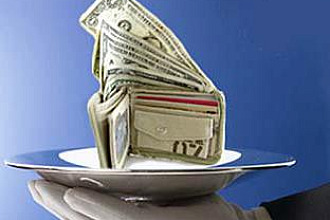We all make mistakes. That’s probably not a great revelation to anyone. However, some mistakes can have much bigger ramifications than others. Forgetting to set your alarm may result in you being late for work one day, but marrying the wrong person will have a tremendous impact on the rest of your life. This concept holds true with your finances as well. Forgetting to mail in the water bill on time may require you to pay a small late fee, but as a one-time occurrence it won’t affect your financial well being.
However, here are 12 all-too-common financial mistakes that people make that end up affecting the rest of their lives.
Not Tithing
While some people feel that they can’t afford to tithe, the reality is that you can’t afford not to tithe. Tithing is an obligation that is clearly laid out in the scriptures. Individuals that choose to spend their tithes on themselves rarely ever find themselves prospering financially. Yet God has promised to pour out blessings on those that following this one Biblical principle.
Only Making Minimum Payments
According to CreditCards.com, 1 out 6 families only make the minimum payment on their credit cards each month. While the average credit card debt has dipped below $5,000 for the first time since 2002, it still stands at a whopping $4,951. Making only the minimum payment on a balance this large will result in thousands of dollars lost in interest payments that could have gone towards your retirement savings. Even worse is that most individuals continue to use and/or misuse their credit cards and so the overall balance just keeps climbing higher. Not only does this lead to wasting tremendous amounts of money on interest, but it also never lets individuals get off the credit treadmill.
Making Late Payments
If you’re late in paying your utility bills you will likely have to pay a nominal late fee of a couple of dollars. However, if you are late on your mortgage or credit card payments the cost is much more significant. The average credit card late fee is now $28. A history of late payments not only will result in significant fees, but will generally trigger higher interest rates and will certainly damage your credit score. This damaging behavior will result in future purchases costing you much more than they should because of your bad credit history.
Living Above Your Means
The most basic fundamental of personal finance is that you can’t spend more than you earn. Those that do are forced to rely on credit to make up the difference. People that consistently use credit to spend more than they can afford are just piling up more debt than they can ever afford to pay back. Young people are particularly susceptible to using credit to fund their lifestyle, without realizing the tremendous burden that debt will create later in life.
Not Maxing Out Your 401(k) Contributions
Turning down free money seems like an obvious financial mistake and yet many people do it every day. According to Fidelity, 80% of companies with 401(k) plans offer matching contributions as a benefit to their employees. If you are failing to contribute enough to your company’s 401(k) program to receive your company’s matching funds, then you are in effect turning down free money. As you near retirement age this will be a decision you will really regret.
Draining Your 401(k)
Just contributing to your 401(k) program is not enough, you also have to avoid the temptation to withdraw that money. A study by Hewitt Associates showed that nearly 50% of all employee’s cash out of their 401(k) when they switch jobs. This results in them having to pay taxes on the amount of the withdrawal as well as a 10% penalty if they are under 59 ½ years old. More importantly this financial mistake will result in having significantly less money available for retirement.
Relying On Social Security
Depending on who you listen to, Social Security may or may not be around by the time you retire. Budget projections show that the system is going to be drained by retiring baby boomers and longer life spans sometime in the next 20-40 years. While it seems unfathomable for our government to allow Social Security to go completely broke, there is a strong likelihood that benefits will be reduced. Relying only on social security to fund your retirement is a financial mistake you are sure to regret.
Always Leasing, Never Owning
Our consumerist society has wholeheartedly embraced the concept of leasing versus owning. We lease cars, houses and even furniture. This reflects both a lack of responsibility and a lust to always have new things. After years of paying for the privilege of borrowing these items, we have to give them right back. While leasing makes sense in some circumstances, in most cases you will end up regretting wasting all that money over the years and not having anything of value to show for it.
Buying the Latest Gadgets
The tendency to rush out and buy the latest gadgets is another financial mistake that you could easily avoid. Simply exercising patience and denying yourself instant gratification can result in tremendous savings. For example, people that rushed to buy the Apple iPhone when it was first released in 2007 paid $399, while those that waited just a few months later could purchase the same iPhone for only $199.
Buying More Than You Need
You might say that our eyes are bigger than our wallets, but Americans have a tendency to buy things that are bigger and nicer than we really need. Middle-class families are convinced that they need to drive a luxury car and live in a mini-mansion stocked with the biggest and best of everything. Buying big ticket items that you don’t need just because it was on sale or had special financing offered it almost never a good idea.
Having Inadequate Insurance
Approximately 1.5 million Americans file for bankruptcy each year. You might be surprised to know that nearly 60% of these bankruptcies are due to exorbitant medical bills. Even the healthiest individuals are at risk for developing a chronic illness or need an emergency medical procedure. Without insurance you could end up saddled with tens of thousands in debt. Not having health, homeowners, auto or life insurance or having inadequate insurance coverage is major financial mistake that you are almost certain to regret.
Not Teaching Your Children Financial Responsibility
In their chase for a life of luxury, many parents are presenting a poor example to their children. It is our duty as parents to teach our children financial responsibility. That buying everything you want without regard to if you can afford it is a path that leads to financial ruin.
Originally from here
Picture from here
Posted on Shalom Adventure by: Brenda Miller


























